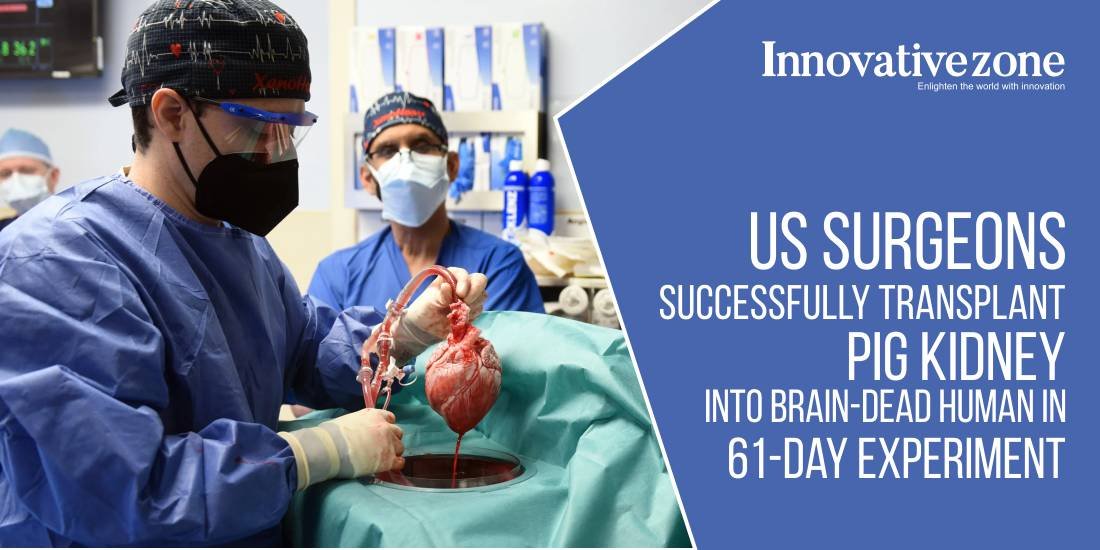US Surgeons Successfully Transplant Pig Kidney into Brain-Dead Human in 61-Day Experiment
Written by Sanjay Kumar
In a remarkable medical achievement, a team of US surgeons has made history by successfully transplanting a genetically modified pig kidney into a brain-dead patient. This groundbreaking experiment, spanning 61 days, marks a significant advancement in the field of xenotransplantation, aimed at addressing the critical shortage of organ donors. The surgery took place under the leadership of Dr. Robert Montgomery, director of the New York University Langone Transplant Institute, who had previously conducted the world’s first genetically modified pig kidney transplant in September 2021.
With over 103,000 individuals on the organ transplant waiting list in the United States, including 88,000 in need of kidneys, this latest achievement brings hope for those seeking life-saving organ transplants.
Dr. Montgomery expressed optimism about the future, stating, “We have learned a great deal throughout these past two months of close observation and analysis, and there is great reason to be hopeful for the future.”
The key to the success of this experiment lay in “knocking out” a specific gene responsible for alpha-gal, a biomolecule targeted by the human immune system. By suppressing immediate rejection, the NYU Langone team paved the way for further research and potential clinical applications.
The genetically modified pig used in this historic transplant came from a carefully cultivated herd maintained by the biotech company Revivicor, based in Virginia. This herd has received approval from the Food and Drug Administration (FDA) to serve as a safe source of meat for individuals with alpha-gal hypersensitivity, an allergy triggered by certain tick bites. Notably, these pigs are bred, not cloned, allowing for a more scalable and sustainable process.
While early xenotransplantation research focused on primate organs, such as the 1984 baboon heart transplant into “Baby Fae,” which tragically lasted only 20 days, current efforts have turned toward pigs. Pigs are considered ideal organ donors due to their organ size, rapid growth, large litters, and their existing role as a food source.
In a separate milestone, surgeons at the University of Maryland Medical School successfully performed the world’s first pig-to-human transplant involving a living patient in January 2022, this time with a heart. Sadly, the recipient passed away two months later, with porcine cytomegalovirus found in the organ, leading to further research and precautions.
Just last week, Chinese scientists unveiled their achievement of hybrid pig-human kidneys in pig embryos, offering an alternative approach to addressing the organ shortage crisis. However, this development has sparked ethical concerns, particularly regarding the presence of human cells in the pigs’ brains.
The successful pig kidney transplant and ongoing developments in xenotransplantation signify significant progress in the quest to save lives through innovative medical procedures. As research continues, the hope remains that xenotransplants may one day provide a viable solution to the organ donation shortage, offering renewed hope for thousands of patients in need.
Must Read:-
- Top 10 Largest Oceans and Seas in the World
- Top 10 automobile companies in India 2023
- Top 10 Electrical Companies in India 2023
- Top 10 Real Estate Companies in India-2023
- Top 10 most awaited & upcoming Hindi web series 2023-24
- Top 10 Clothing Brands in India 2023
- Top 10 best cultures in the world-2023
- Top 10 best country to work and live in 2023
- Top 10 best country for education 2023
- Top 10 Most Followed Celebrities on Instagram 2023
- The Inspiring Success Story of Bear Grylls
- Top 10 Business Coaches in The World to Guide Entrepreneurs In 2023
- Top 10 movies based on True Stories you must watch before you die
- Top 10 Best Online Doctor Consultation Apps in USA








